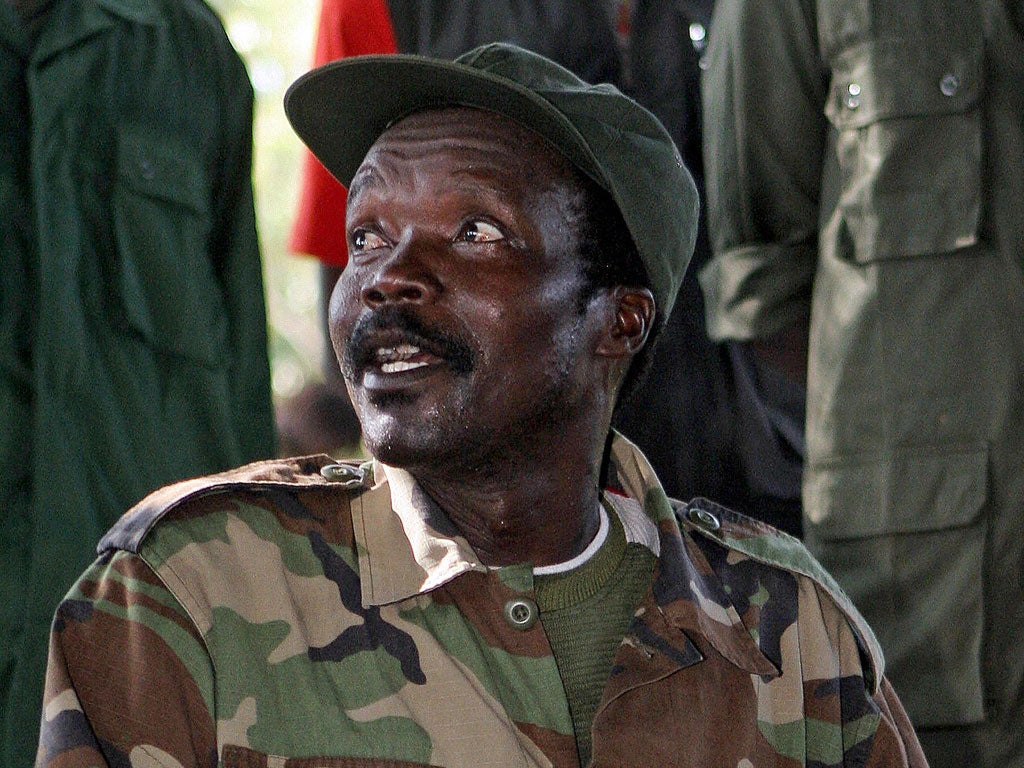The Independent's journalism is supported by our readers. When you purchase through links on our site, we may earn commission.
When villains go viral
A film that challenges a Ugandan warlord is an internet sensation, but is collective outrage the best way to call for change?

How do you go about solving Uganda's problems? Here's one proposal: make Joseph Kony famous. The plan is the brainchild of Jason “Radical” Russell, the cofounder of an advocacy group called Invisible Children. Earlier this week, Invisible Children posted a video about Kony, a monstrous Ugandan warlord, online. The film, Kony 2012 (ind.pn/konyvideo) is a masterful piece of work, and so is the campaign surrounding it: by mid-afternoon yesterday it had been viewed an astonishing 45 million times. It explains the dire consequences of Joseph Kony's forcible recruitment of children to his guerrilla Lord's Resistance Army, and details the appalling killings and rapes his juvenile militia have performed under his tutelage.
Kony's tyranny, Russell suggests, has ravaged Uganda. But it can be stopped. And who is going to stop it? We are. (We, the video seems to suggest, are mostly white American college students, going about our intervention by running across parks, and wearing T-shirts, and giving peace signs.) Even better, celebrities are. The video proposes a list of 20 "culturemakers" whose "awareness" could make all the difference. And Kony is famous now all right. "KONY2012," tweeted Rihanna: "Spread the word!!!" Oprah Winfrey did the same. Even Justin Bieber got in on it. "Joseph Kony is a dirtbag," one of his retweets read. Another: "It's so important to follow what's going on in the world!"
It sure is, Justin! And well done you for investing the half hour it took to watch the video before redistributing it. But there's a problem here. Those 30 minutes might not have given you a complete understanding of the issues. (I know!) And as well as all that well-intentioned support, there has been a smaller – but no less intense – flurry of criticism, most from the people who know the subject best. They point out that Joseph Kony has not been in Uganda for years, a fact that the film doesn't acknowledge until 15 minutes in; today, his victims are in the Democratic Republic of Congo. They add that the LRA is a tiny part of the problem of militias rampaging across the region. They wonder whether there isn't a hint of imperialism in the whole thing.
To all of which, you might say: OK, this video isn't going to save Uganda. But the world would still be a better place if Kony were brought to justice, right? It must mean something for so many previously unengaged people to be thinking about the region. Angelo Izama, an award-winning Ugandan journalist and political risk analyst, isn't convinced it means anything at all – or anything good, anyway. "A moment like this has a kind of placebo effect," he says. "These simplistic views make it very difficult to make people address a situation that is really complex. It helps the status quo. But the status quo has failed."
Izama also laid out a detailed explanation of an oil deal that's crucial to Uganda's future. Online, he's also argued that the real invisible children in Uganda today are the ones suffering from a mysterious and debilitating ailment called "nodding disease". It's complicated stuff, but pretty compelling, if you get a chance to have a look at it. The problem is, Izama has 1,550 Twitter followers. And Justin Bieber has more than 18 million. So: maybe the thing to do isn't to make Joseph Kony famous. Maybe it's to make people like Angelo Izama famous, instead.
Join our commenting forum
Join thought-provoking conversations, follow other Independent readers and see their replies
Comments
Bookmark popover
Removed from bookmarks